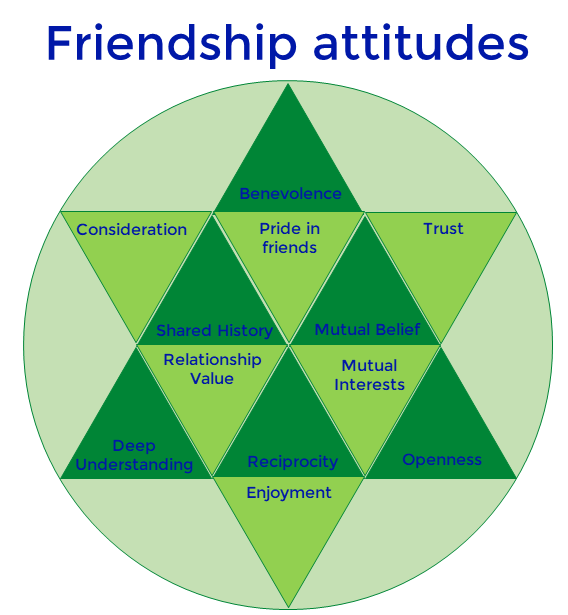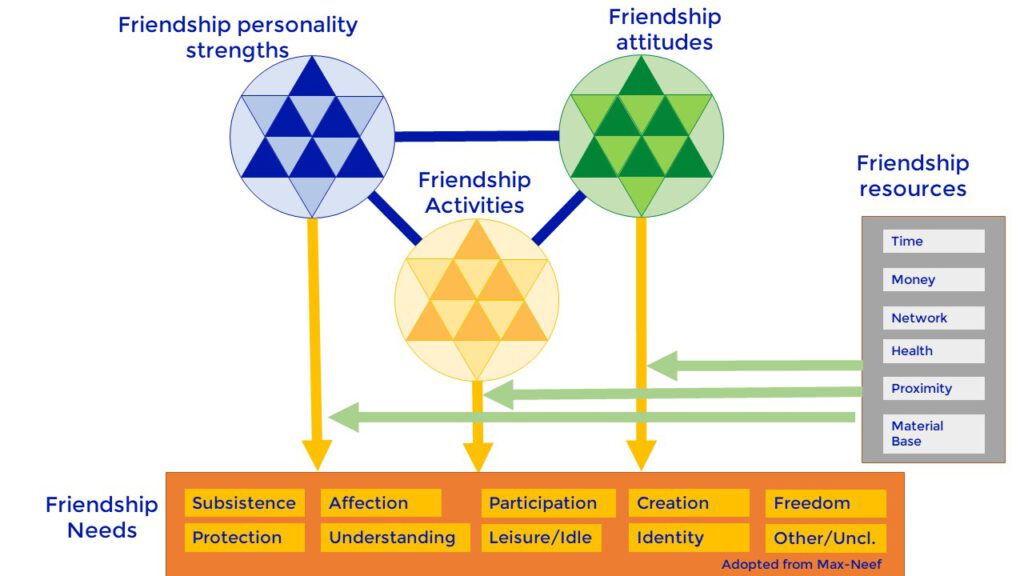These are the attitudes you have or display to your friend in the friendship. These are only partially universal, in the sense that unlike the personality traits, these can vary in intensity and applicability from friendship to friendship and role or type you assume in this friendship pair or circle.

Benevolence
Wishing your friend well and being interested in their wellbeing is the defining element of friendship.
Consideration and Non-competition
This is taking your friends needs into account, potentially taking one for the team. Not chatting to that pretty girl or handsome boy because you know your friend has a crush on him/her, recommending a friend for a job even though you might have liked it yourself, going to the cinema even though you might have preferred the theatre etc., or actively coming to your friends help at financial, emotional or time cost to yourself.
Pride in your friends
Pride in your friends gives them confidence. It is affirming them, publicly stating that you approve of their character and support them.
Trust and Confidentiality
Keeping secret or confidential stories or items just that – confidential. Starting small, this builds over time as little ‘trust trials’ are being observed and remain unviolated.
History shared and loyalty
This is the hoard of history, joined stories and experiences. The capability to reminisce with your friend, and to understand each other based on these past encounters.
Mutual Belief and Cultural Background
Having the same beliefs or cultural background offers a common ground from which to build trust and closeness.
Relationship Value
This is about really appreciating the relationship that has built up, and communicating it. It is also the active interest in maintaining it, and includes the act of forgiveness in order to salvage it in crisis.
Mutual Interests
Mutual interest binding together friends also is a classic theme. Interests and life goals, fascination for sports, political or social causes (with the actual intent to do something about it), all leading to a range of joined activities.
Deep Understanding
This is the capability of understanding the other and the feeling of being understood on a deep level. It enables the state of quality time, that Chapman writes about in quality time.
Reciprocity and Feeling Needed
A friendship being one of equals is a recurring theme in literature, and this means that both friends are both giving and receiving, though there might be differences in timing and kind. But imbalanced relationships usually end up breeding resentment over time.
Openness and Vulnerability
This is another one of the key enablers, as friendship is an authentic relationship from person to person, thus requiring friends to be open with each other. Again, in particular in male friendships, this attitude will only grow in time in tandem with trust.
Love and Affection
Whilst love and affection are usually mentioned in romantic love, great expressions have throughout the ages been used in classical nonromantic friendships both between men and women.
Enjoyment of the encounter
Be it because of the fun and laughter, the positive energy, the interesting discussion or the warmth experience, a key theme is that friends again and again come together is because they experience thorough joy in their encounter making them want to continue meeting.
This constitutes the ‘green circle’in the Friendship Framework

